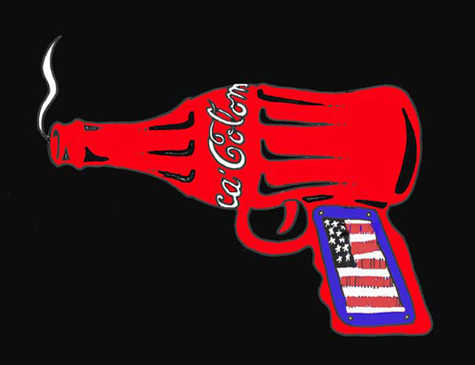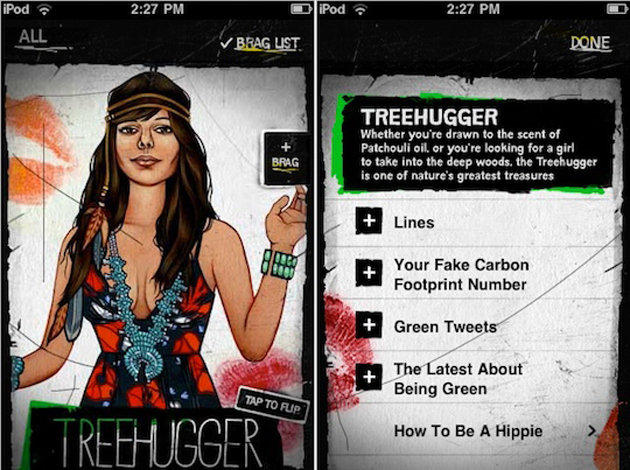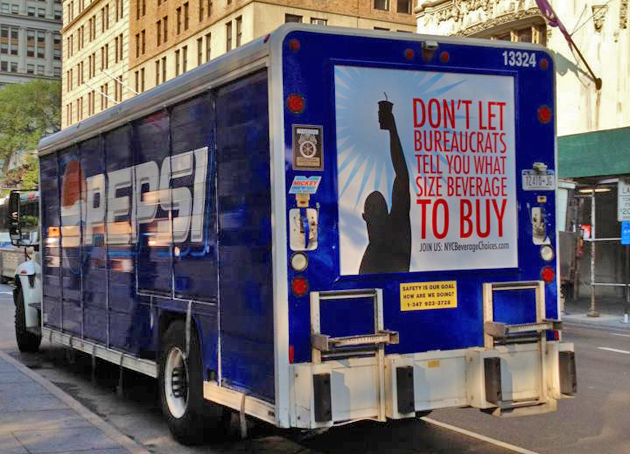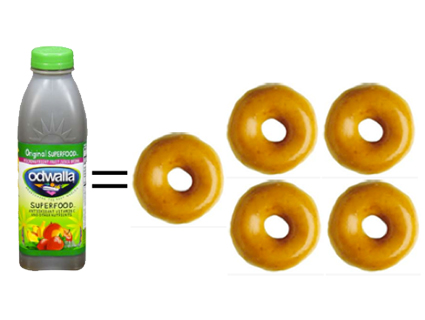
Ring: <a href="http://www.shutterstock.com/pic-22883647/stock-photo-a-d-generated-professional-boxing-ring-empty-showiing-audence-in-back.html?src=dDq730ydjSttGedLalVItg-1-52">James Steidl</a>/Shutterstock; Coke: <a href="http://www.flickr.com/photos/elsie/4023275760/sizes/m/in/photolist-78wkHs-79Wz6z-7obmDo-af4t7e-9GBmP4-dpeXV7-aVy8gt-aVy8wX-aVy8pZ-bQUepB-epXTR3-ep2EKT-epXUks-8zcFVc-d7TA2f-7ywjKJ-8i3a3G-8aSbpA-8i2BdS-8i2Lbj-8hYDkR-8hYpUr-8i2NpN-8i2Fy5-8i2QzL-8hYuir-fbw2XW-9DhQ7J-81txkz-9WtgCc-brx7xX-7HvJwB-9Z5rRT-8Bfq7D-9BoSRv-7Q8mBT-cES9Hf-czYdn7-9eXnGJ-9PWS83-9U6iQF-akEk4e-ek9rNs-8WRU2b-9cZh6f-a5KsBM-f8B7vG-fmDozi-7UuZtR-8Mft9c-8MftcD/">Elsie esq.</a>/Flickr; Pepsi: <a href="http://www.flickr.com/photos/mpd01605/4326343205/sizes/m/in/photolist-7AiD7e-8r8kN1-8r8kKy-cPS5LA-ahTUMW-azbsCk-a2kqnw-7EzXcw-bZeKj3-9EquyV-e64t33-9dUdSY-ehyPP1-cvP2uL-aiqkjF-8exrKs-918s8g-aCBVzj-91bAD5-7AnpsS-7AiD88-7Anpm3-86JtgJ-eYydoj-eYmNWX-eYmQLk-eYyevU-cUrpwq-8kZLFQ-cUriLs-85y9wv-9ZeeqN-9xhAzY-9Knkt2/">MPD01605</a>Flickr; Gloves: <a href="http://www.shutterstock.com/pic-110695982/stock-photo-boxing-gloves-close-up.html?src=IqdCfV4UhVAE5E7pU5MXYA-1-4">OZaiachin</a>/Shutterstock. Photoillustration by Matt Connolly.
In response to a recent lawsuit, the Grocery Manufacturers Association recently revealed the source of $7.2 million in dark-money contributions it had solicited to fight Washington’s Initiative 522, a measure on next week’s ballot that would require food companies to label products with ingredients made from genetically modified organisms. Pepsi was the largest contributor to the trade group’s anti-labeling effort, donating $1.6 million. Coca-Cola wasn’t far behind, chipping in another $1 million.
If you don’t like GMOs, then you probably shouldn’t drink either of America’s leading soda brands. But let’s say Coke and Pepsi products are your only options. How do the two soda giants compare on the social-responsibility index? Here’s our totally subjective guide to the relative malevolence of America’s favorite pop-making multinationals.
deadliness in excess
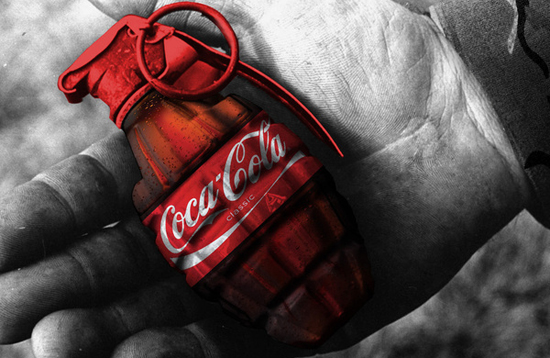
| Coke: Guzzling between 6 and 10 liters of Coke daily contributed to the sudden death this February of 31-year-old Natasha Harris of New Zealand, according to her coroner’s report. | Pepsi: Nobody would ever drink this much Pepsi. |
Most evil: Coke
Sketchy marketing
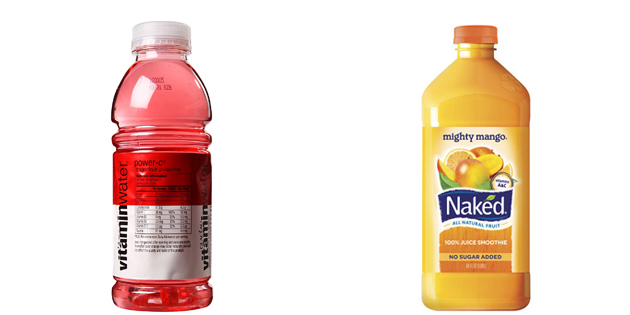
| Coke: Faces an ongoing class-action lawsuit over the health claims of Glacéau Vitaminwater, which contains eight tablespoons of sugar per bottle. Vitamins? Not so much. | Pepsi: In 2011, settled a $9 million class-action lawsuit over Naked Juice’s claims to contain “all natural” and “non-GMO” ingredients. |
Most evil: Tie
Paramilitary death squad hiring?
| Coke: Two of its bottlers hired a Colombian paramilitary group to murder union organizers, according to a 2001 lawsuit filed in the US by the United Steelworkers union. The case was dismissed in 2009, but these and similar allegations in Guatemala have sparked boycotts and street protests. Coke denies the claims. | Pepsi: Do people in Latin America even drink Pepsi? |
Most evil: Coke
orangutan endangering

| Coke: Loved by orangutans, apparently.
|
Pepsi: Contributes to the killing of orangutans by purchasing conflict palm oil, the Rainforest Action Network alleges. |
Most evil: Pepsi
racism
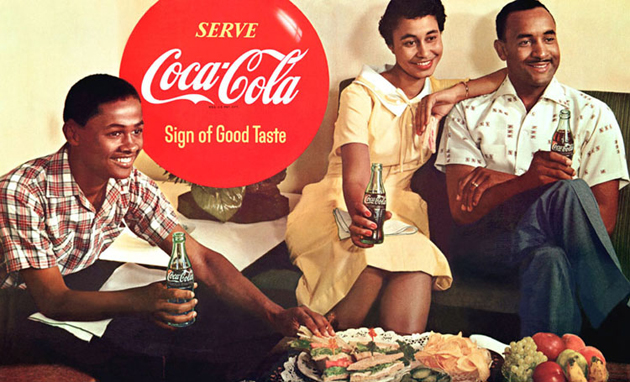
| Coke: In 2000, paid $156 million to 2,000 current and former African American employees to settle what was then the largest racial-discrimination case ever. | Pepsi: Last year paid $3.1 million to resolve a federal charge that it discriminated against 300 African American job applicants. |
Most evil: Coke (Pepsi’s case was more recent, but Coke’s was waaay bigger)
Sexism
| Coke: An interactive online ad that ends, in one scenario, with a woman standing next to a bed in her underwear, was lambasted by Sweden’s sexist ad watchdog for portraying women as “pure sex objects.” | Pepsi: To promote an energy drink, released an iPhone app (above) that coaches men on pickup lines and encourages those who “score” to post details such as name, date, and comments to Facebook and Twitter. |
Most evil: Pepsi (Objectifying women = bad. Posting names of sexual conquests online = ick!)
Public-Relations LAMENESS
| Coke: Funded a (now discredited) Harvard scientist: One of the sweets’ industry’s biggest allies, he touted sugar as perfectly healthy. | Pepsi: Has funded astroturfy groups like the Heartland Institute, which questions “how bad the obesity problem is.” |
Most evil: Coke (People take Harvard seriously. The Heartland Institute, not so much.)
pro-Gluttony Lobbying
| Coke: Spent $9.4 million lobbying against a tax on sugary beverages. | Pepsi: Spent $9.2 million lobbying against the tax. |
Most evil: Tie
Evicting farmers from their land

| Coke: Criticized by Oxfam for its links to land disputes that have driven subsistence farmers into poverty. | Pepsi: Ditto. |
Most evil: Tie
Replacing Jesus with a cola-chugging fat guy

| Coke: Coca-Cola ads that first appeared in 1931 in the Saturday Evening Post and other national magazines popularized the modern image of Santa Claus as a pudgy guy dressed in red. The rest is history. | Pepsi: Pushes an alternative image of Santa as a party dude who secretly drinks Pepsi when he’s on summer vacation at the beach. |
Most evil: Pepsi (At least Coke used its Polar Bears to draw attention to global warming.)
Shameless spin
| Coke: Its ad (above) about fighting America’s obesity epidemic may have actually contributed to the problem by spinning Coca-Cola products as components of a healthy lifestyle. Critics responded with a parody video that ends with the exhortation: “Don’t drink Coke.” | Pepsi: “We firmly believe companies have a responsibility to provide consumers with more information and more choices so they can make better decisions,” PepsiCo CEO Indra Nooyi wrote in a PR essay that appeared in one of the country’s most respected annual reports on obesity. Huh? |
Most evil: Coke (There’s a reason the parody video has more YouTube views than the actual ad.)
And the winner is…
Index of Soda Evil
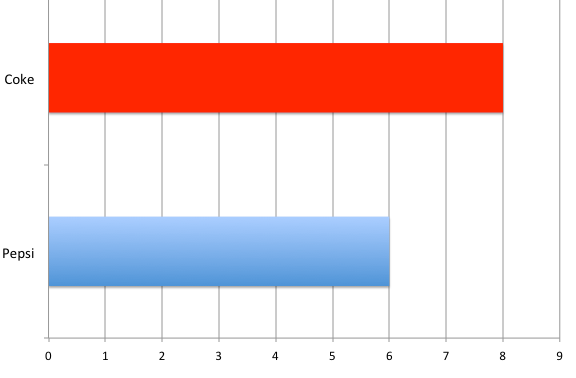
Now about that Izze you’re drinking…Oh, dang! PepsiCo owns Izze, too.

